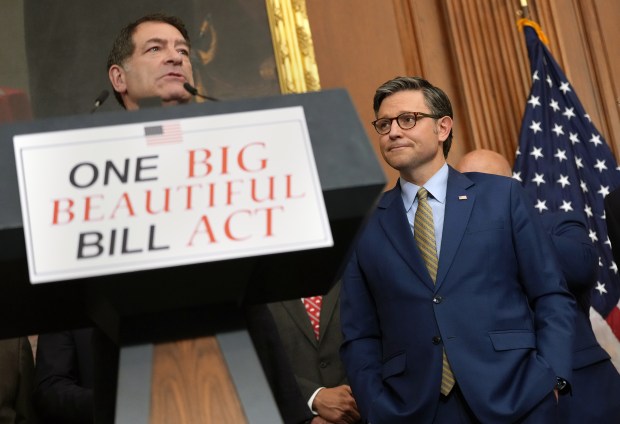It has been a year since Illinois took the historic and courageous step toward transforming our criminal legal system by implementing the Pretrial Fairness Act and ending the use of money bond. We are the first state in the nation to completely end the role of wealth in pretrial release and detention decisions, and after a year, we can say we have been successful.
As we mark this significant milestone, we must recognize the profound impact of what we’ve accomplished and commit to further advancing justice and equity in our criminal legal system.
Ending money bond was not just a legislative action about altering a legal procedure. It was a movement centered on reimagining the principles of fairness and justice within our criminal legal system. Accomplishing this massive reform took years of dedicated effort and coalition building across a diverse group of stakeholders, from public defenders and prosecutors to crime survivors and union workers. And let’s not forget the everyday Illinoisans who drove this work to boldly challenge the status quo. We legislators joined that call in 2021, inspired by the millions of Americans protesting the police killings of George Floyd, Breonna Taylor and countless other Black and brown people.
We are so proud of what we were able to accomplish in the legislature. But we are even more proud that this was a movement by and for Illinoisans. It was their vision of a more equitable pretrial system that shaped the Pretrial Fairness Act into what it is today. We just had the privilege of shepherding it through.
Before the Pretrial Fairness Act, money bond operated as a prevailing tool of inequality, disproportionately affecting Illinoisans who could not afford to pay. It often resulted in pretrial jailing based solely on how much money a person had in their bank account. If you were rich, you could pay your way out of jail— no matter how heinous the crime. If you were poor, you could be jailed awaiting trial, even for the pettiest of cases, simply because you didn’t have a dollar to your name.
Unsurprisingly, the majority of the people forced to remain in jail because they couldn’t afford to pay a money bond were people of color. In 2019 in Illinois, Black people made up 50% of the jail population, almost quadruple their share of the state’s population, according to a report from Loyola University Chicago. Not only did wealth-based detention lead to more poor Black people being jailed pretrial, but it also led to more people pleading guilty. People detained pretrial on unaffordable money bonds often had to make the impossible choice between entering a guilty plea to get out of jail and back to their lives or remain in jail awaiting a trial that might happen months or even years later.
Research shows that unaffordable bonds are a major contributor to racial disparities in guilty pleas. Pretrial detention, even for a few days, has serious destabilizing effects, such as the loss of employment, housing and even custody of a child. It makes sense, then, that pretrial detention is linked to harsher sentences and increased risk of future arrests.
Completely abolishing money bond may be considered revolutionary, but it also is common sense. Our new system prioritizes public safety over wealth, allowing judges to make individualized decisions about whether someone should be released or detained. That’s how justice is supposed to work.
And yet, many believed that it couldn’t be done, and some fought tooth and nail to stop us. They claimed the sky would fall, criminals would run the streets and chaos would reign. They were wrong.
It turns out that replacing broken tough-on-crime systems with policies that are smart on violence works. Jail populations are down across the state, and people are able to maintain their lives — keep their jobs, their housing and their families intact — while their cases are pending. That stability makes us all safer. Not only did the crime wave our opponents predicted never occur, but also, homicides are actually down in Chicago this year compared to last. This only proves that we can take steps toward ending mass incarceration while maintaining public safety.
Ending money bond is more than a moral victory; it’s also beneficial for the economy. For decades, pretrial incarceration has taken resources away from poor, mostly Black and brown communities, further entrenching families in poverty. From 2016 to 2020, Illinoisans spent approximately $121 million to $154 million per year on money bonds. That money will now remain in communities and help families build economic security, which ultimately improves lives and also public safety.
At its core, the Pretrial Fairness Act is based on the principle that justice should be about evaluating individuals who are awaiting trial based on public safety, not the size of their bank account. The Pretrial Fairness Act underscored Illinois’ commitment to the principle that justice cannot be bought and that justice is not for sale. Ending money bond is a landmark reform, and its anniversary must be celebrated.
Nevertheless our work is far from complete. We must protect the Pretrial Fairness Act and continue pushing for additional reforms that address other critical aspects of our justice system, such as enhancing diversion programs, improving access to drug treatment and mental health services, and ensuring that every Illinoisan has access to a high-quality public defense when they need it.
Together, let’s build on this victory and work toward a future where justice is accessible and equitable for all.
State Sen. Robert Peters represents the 13th District. State Rep. Justin Slaughter represents the 27th District.
Submit a letter, of no more than 400 words, to the editor here or email letters@chicagotribune.com.




